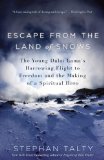Summary | Excerpt | Reviews | Beyond the Book | Readalikes | Genres & Themes | Author Bio
The Young Dalai Lama's Harrowing Flight to Freedom and the Making of a Spiritual Hero

Critics' Opinion:
Readers' Opinion:
First Published:
Jan 2011, 320 pages
Paperback:
Jan 2011, 320 pages
 Book Reviewed by:
Book Reviewed by:
Jo Perry
Buy This Book
What he was trying to avoid thinking of as he walked was the dream he’d had last year. He’d seen massacres in his mind, Tibetan men, women, and children being shot and killed by Chinese troops and his lovely Norbulingka turned into a “killing ground.” This he kept to himself. (But some of his subjects would later report they had had the same dream at the very same time.) He knew that such scenes, if they were allowed to unfold in Lhasa, would be the prelude to something much larger. “I feared a massive, violent reprisal which could end up destroying the whole nation,” the Dalai Lama said.
Lhasa (whose name means “place of the gods”) had first appeared to him as a city of wonders. Almost twenty years before, he’d entered the capital on a golden palanquin constructed of a curtained box set on poles carried by teams of young men, with massive crowds cheering his approach and bowing to him with the ceremonial katas, or white scarves, in their hands. “There was an unforgettable scent of wildflowers,” recalled the Dalai Lama. “I could hear [the people] crying, ‘The day of our happiness has come.’ ” But it hadn’t. In fact, during his reign, disaster had followed disaster. Men in the east of the country were now being “driven into barbarism,” forced to fight the Chinese and dying in the battles, ensuring themselves a rebirth as lower animals and demons. And Lhasa too was growing unstable.
The sun was climbing over the small mountains to the east. Soon he would have to return to the palace.
Perhaps what was most shocking about what had happened in the past few days was that the idea of escape wasn’t entirely repugnant to him. It would be devastating to his people, for whom he was Kundun, the Presence, the spirit of Tibet itself. It would be equally devastating for the nation, for the idea of an independent Tibet, and it cut at his heart to contemplate what it would mean for the future. But it wouldn’t necessarily be devastating to him. The notion of escape had always appealed to the Dalai Lama, ever since he was a boy in the Amdo hills, before the search party seeking the next incarnation of Chenrizi— the deity that manifested itself in each successive Dalai Lama— had knocked on his parents’ door. When he was only two, he would pack a small bag, tie it to a stick, and tell his mother he was leaving for Lhasa. He had always been an unusual boy, but those moments astonished her. And twenty years later, the idea of leaving still intrigued him. He knew that freedom of the kind he had tasted only briefly in his life was impossible in Tibet. Even without the occupation, Lhasa for a young Dalai Lama was often a dark and suffocating passageway.
He didn’t wish to leave, nor was it even clear that he could if he wanted to. Some 40,000 Chinese troops were stationed in and around Lhasa, and he’d have to be spirited past their patrols. And if he did flee, Tibet, in a way, vanished from Tibet. He was central to every Tibetan’s sense of his or her own life in a way that no other leader, not even Mao in China— Mao, who was finally revealing himself in these horrible days— could equal. He was the storehouse of the Buddhist Dharma, a subject that had once bored him profoundly but that now quickened his every thought. Was it possible that that too could disappear from his country, from the earth itself?
The Dalai Lama took the path that turned and wound back toward his home on the Norbulingka grounds. He could hear the crowds stirring outside. The chants would begin soon. He didn’t hurry.
Excerpted from Escape from the Land of Snows by Stephan TaltyCopyright © 2010 by Stephan Talty. Excerpted by permission of Crown, a division of Random House, Inc. All rights reserved. No part of this excerpt may be reproduced or reprinted without permission in writing from the publisher.





The Flower Sisters
by Michelle Collins Anderson
From the new Fannie Flagg of the Ozarks, a richly-woven story of family, forgiveness, and reinvention.

The House on Biscayne Bay
by Chanel Cleeton
As death stalks a gothic mansion in Miami, the lives of two women intertwine as the past and present collide.

The Funeral Cryer by Wenyan Lu
Debut novelist Wenyan Lu brings us this witty yet profound story about one woman's midlife reawakening in contemporary rural China.
Your guide toexceptional books
BookBrowse seeks out and recommends the best in contemporary fiction and nonfiction—books that not only engage and entertain but also deepen our understanding of ourselves and the world around us.